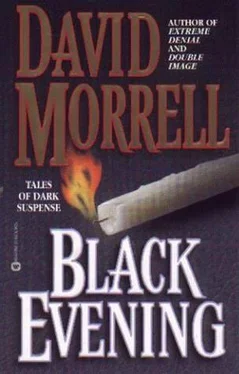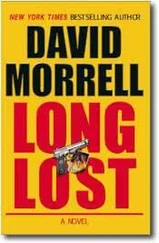David Morrell - Black Evening
Здесь есть возможность читать онлайн «David Morrell - Black Evening» весь текст электронной книги совершенно бесплатно (целиком полную версию без сокращений). В некоторых случаях можно слушать аудио, скачать через торрент в формате fb2 и присутствует краткое содержание. Жанр: Ужасы и Мистика, на английском языке. Описание произведения, (предисловие) а так же отзывы посетителей доступны на портале библиотеки ЛибКат.
- Название:Black Evening
- Автор:
- Жанр:
- Год:неизвестен
- ISBN:нет данных
- Рейтинг книги:4 / 5. Голосов: 1
-
Избранное:Добавить в избранное
- Отзывы:
-
Ваша оценка:
- 80
- 1
- 2
- 3
- 4
- 5
Black Evening: краткое содержание, описание и аннотация
Предлагаем к чтению аннотацию, описание, краткое содержание или предисловие (зависит от того, что написал сам автор книги «Black Evening»). Если вы не нашли необходимую информацию о книге — напишите в комментариях, мы постараемся отыскать её.
Black Evening — читать онлайн бесплатно полную книгу (весь текст) целиком
Ниже представлен текст книги, разбитый по страницам. Система сохранения места последней прочитанной страницы, позволяет с удобством читать онлайн бесплатно книгу «Black Evening», без необходимости каждый раз заново искать на чём Вы остановились. Поставьте закладку, и сможете в любой момент перейти на страницу, на которой закончили чтение.
Интервал:
Закладка:
The first episode, "Black November," involved a small Southern town haunted by a grisly secret from years earlier – the ax murder of a German prisoner-of-war and the minister who tried to protect him. I'd never seen a story like it, not merely the mystery, suspense, and action (a scene involving a power saw remains vivid in my mind) but the appeal of the characters and the reality conveyed by the writing. I discovered that I was waiting eagerly for Friday night to come around again – and the next Friday night – and the next. There was something about the way the characters talked, the emotions they expressed, the values they believed in, that affected me deeply and woke my mind.
For the first time in my life, I began to study credits. Who on earth was responsible for this wonderful experience? One episode would be about shrimp boats in the Gulf of Mexico, with a plot that paralleled Shakespeare's The Taming of the Shrew . Another would be about street gangs in Los Angeles, with poetical dialogue amid the squalor. Still another would be about cropdusting in Phoenix, with tragic overtones of Greek myth. Back then, I didn't know anything about Sartre or existentialism or the philosophy of the Beat generation. But even if I couldn't put a name to what I was experiencing, it made me feel emotionally and intellectually alive. Martin Milner and George Maharis were the stars. Still, despite their considerable acting talents, I felt uncharacteristically attracted to the minds behind the scenes, to the creative forces that invented the dramatic situations and put the words (sometimes spellbinding speeches that lasted five minutes) in the actors' mouths. Herbert B. Leonard was the producer. Sam Manners was the production chief. Okay. But still… Then I realized that one other name appeared prominently in the credits of almost every episode. Stirling Silliphant. Writer. My, my. A new thought.
That grade-eleven student, who formerly had no ambition whatsoever, managed to find the address of Screen Gems, the company listed at the end of the credits. Unable to type, I sent a handwritten letter ("scrawled" would be more accurate) to Stirling Silliphant and asked how I could learn to do the wonderful things that he was doing. One week later (I still recall my amazement), I received an answer from him – two densely typed pages that began with an apology for having taken so long to get back to me. He'd have written to me sooner, he explained, but when my letter arrived, he'd been out at sea in a boat. He revealed no secrets and indeed refused to look at anything I might write (partly because of my inexperience and partly for legal reasons), but he did tell me this. The way to be a writer is to write and write and write and…
Millions of words later, I'm still writing. If not for Stirling, I would never have gone on to college. I wouldn't have gotten a B.A., let alone an M.A. and a Ph.D., wouldn't have met Philip Klass, wouldn't have written First Blood . One of my greatest thrills came on a summer afternoon in 1972 when Stirling phoned to thank me for having sent him a copy of First Blood and to say that he'd liked it, that he was gratified to have been an inspiration. "If I were a cat," he said, "I'd purr."
We stayed in touch but never met until the summer of 1985 when he suggested that I come to Los Angeles and spend the Fourth of July weekend with him. Twenty-five years after I first experienced his work, I finally got to meet him, a stocky, broad-smiled, gentle-featured man with short gray hair and generous good nature. It was like coming face-to-face with the father I'd never known. Finally, in a closing of the circle, he took my novel, The Brotherhood of the Rose , to NBC and suggested that they do a miniseries of it. In 1989, when the series was broadcast after the Superbowl, the most coveted spot in television, I was struck by awe when I watched the credits and again saw the magical words: Executive Producer Stirling Silliphant .
Shortly afterward, Stirling told me that in one of his former lives he had lived in Thailand and that now he was going home. He had a Beverly Hills garage sale, moved to Bangkok, and had the luxury of writing whatever he wanted with no deadlines except his own. We often talked about my coming to visit him, but our various schedules kept conflicting. My only contact with him was via frequent faxes. Regret is a terrible emotion. At a little after 8 a.m. on the morning of April 26, 1996 (as with the debut of Route 66 , I can be very specific about this moment), I was eating breakfast, listening to the news on National Public Radio, when the announcer informed me, "Academy-Award-winning screenwriter, Stirling Silliphant, died this morning from prostate cancer. He was 78." My Cheerios stuck in my throat. It was two days after my birthday. The man I thought of as my father was gone.
Stirling was as determined a writer as I ever encountered. He once had two wisdom teeth extracted in the morning and was hitting the typewriter keys by noon. He worked almost every day and was religious about meeting deadlines. Legendary for being prolific and fast, he was hesitant to show a complete list of his credits because he was certain that no one would believe that anyone could write that much. I've never been prolific or fast, but at his best, his action-filled scripts were inventive, compelling, and thoughtful: his Oscar-winning screenplay for In the Heat of the Night , for example, not to mention his television work for Naked City . I have tried to follow his example.
Thus my first contact with Hollywood was positive. The troubled street kid who became addicted to movies as an antidote to the darkness of his life found that the dreams those movies inspired could, with hard work, be fulfilled. But many who've been exposed to Hollywood have had the opposite experience. Too often, writers are treated with indifference at best and malicious contempt at worst. They're stonewalled, misled, or blatantly lied to. Some producers can't imagine showing courtesy to anyone they don't have to impress. Their inability to relate to others borders on the sociopathic. That never happened to me on any of the projects based on my works, but I certainly came across it in other contexts, enough so that I eventually decided to write about the bottom part of dreams in Hollywood. This is the final story in my trilogy about the paradoxes of ambition and the dark side of success. We began with a paper boy. We moved on to a teenaged football player. We now meet an adult who tells us about the heartbreak of the movie business. I haven't updated the financial figures in this story. After the $200 million price tag of Titanic , I'm amazed to look back at how comparatively cheaply a film once could get made. The following story was a finalist for the World Fantasy Award as the best novella of 1985.
Dead Image
"You know who he looks like, don't you?"
Watching the scene, I just shrugged.
"Really, the resemblance is amazing," Jill said.
"Mmm."
We were in the studio's screening room, watching yesterday's dailies. The director – and I use the term loosely – had been having troubles with the leading actor, if acting's what you could say that good-looking bozo does. Hell, he used to be a male model. He doesn't act. He poses. It wasn't enough that he wanted eight million bucks and fifteen upfront points to do the picture. It wasn't enough that he changed my scene so the dialogue sounded as if a moron had written it. No, he had to keep dashing to his trailer, snorting more coke (for "creative inspiration," he said), then sniffling after every sentence in the big speech of the picture. If this scene didn't work, the audience wouldn't understand his motivation for leaving his girlfriend after she became a famous singer, and believe me, nothing's more unforgiving than an audience when it gets confused. The word-of-mouth would kill us.
Читать дальшеИнтервал:
Закладка:
Похожие книги на «Black Evening»
Представляем Вашему вниманию похожие книги на «Black Evening» списком для выбора. Мы отобрали схожую по названию и смыслу литературу в надежде предоставить читателям больше вариантов отыскать новые, интересные, ещё непрочитанные произведения.
Обсуждение, отзывы о книге «Black Evening» и просто собственные мнения читателей. Оставьте ваши комментарии, напишите, что Вы думаете о произведении, его смысле или главных героях. Укажите что конкретно понравилось, а что нет, и почему Вы так считаете.












